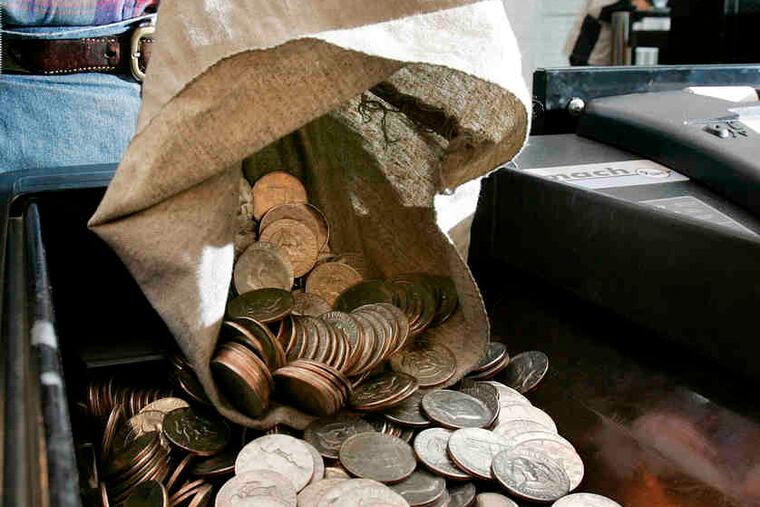PhillyDeals: Employer contribution to school workers' retirement to rise
The "employer contribution" to the Pennsylvania Public School Employees' Retirement System will jump from $5.64 for every $100 paid to teachers and other school workers in 2010 to $8.65 per $100 paid in 2011, according to PSERS.

The "employer contribution" to the Pennsylvania Public School Employees' Retirement System will jump from $5.64 for every $100 paid to teachers and other school workers in 2010 to $8.65 per $100 paid in 2011, according to PSERS.
That works out to $1.2 billion compared with $800 million in 2010. School property taxes will pay nearly half the total, and the state - from taxpayers' dollars - the rest.
PSERS says its investment profits and current payments by schools, the state, and school employees aren't enough to keep pace with expected future checks for growing numbers of retired principals, teachers, administrators, custodians, drivers, and cafeteria workers.
PSERS expects the pension surcharge to zoom again, to more than 12 percent of payroll, next year, and rise above 20 percent by 2015, unless the General Assembly and Gov.-elect Tom Corbett change how Pennsylvania pays for its promises to retired school employees, either by limiting pensions for future hires, or, as in the past, by reducing payments for the next few years and leaving a bigger deficit for future taxpayers.
Hear me now?
Brightpoint Inc., of Indianapolis, says it has agreed to pay $80 million to Graham Group's Striker Partners of Newtown Square to acquire Touchstone Wireless Repair and Logistics, a mobile-phone repair company that employs 1,800 at its Hatfield headquarters and at sites in Tennessee, Texas, and Puerto Rico. It fixes phones for Motorola and other big brands.
Striker officials would not say how much they made on the deal, which followed investments they made in the mid-2000s. In a statement, Touchstone boss Allen Hurley called it "a tremendous opportunity" for his workers. Brightpoint didn't respond to calls asking what it will do with the Hatfield center.
PNC's Harris Williams & Co. advised Touchstone. Blank Rome L.L.P., of Philadelphia, and Blackstone Advisory Group advised Brightpoint.
Changed
Linda Costello isn't a TD Bank customer. Her husband, Bob, is. He inherited the Canada-based bank when it bought Commerce Bank, and his investment management firm's account there, three years ago. Still, Linda, a homemaker, had gotten in the habit of taking advantage of the free-change machine at Bob's bank, which calls itself "America's most convenient," in their eastern Montgomery County neighborhood.
Last week, Linda stopped by with a bag of change. She says branch staff watched her dump it in, then pointed out, since she's not a customer, TD has started levying a 6 percent charge on change-machine users who don't have accounts. The sign advertising the change, Linda says, is "the size of your thumb." The Costellos aren't pleased.
"That's a tough one," says TD spokeswoman Rebecca Acevedo. "If the husband was with her, we could have obtained his account information and waived the fee." But not without Bob. (TD promises to add more signs explaining the new charges, including notices on the change-machine computer screens.)
TD wants to cover its costs, at least with non-customers. But Commerce founder Vernon Hill Jr. called TD's new fees "a betrayal of the Commerce customer promise," which included free change.
"Both Metro Bank US and Metro Bank UK," two banks Hill backs that are modeled on the old Commerce, "would never charge customers or non-customers for coin counting," Hill said.
Wal-Mart urban strategy
Wal-Mart's plans to build "dozens" of new, smaller stores in New York and Chicago suggest the nation's largest retailer will eventually build "several hundred new stores" in those cities plus "Los Angeles, Philadelphia, San Diego," and other urban areas, writes Janney Capital Markets analyst David Strasser.
Maybe that's bad news for urban bodegas, or the state-subsidized grocers popping up in Philadelphia in recent years.
Strasser says urban America will give Wal-Mart "higher productivity, higher margins, and better return on capital," compared with its previous speculative plans to expand in Africa and India. He cheered Wal-Mart's recent closing of its Russia office.